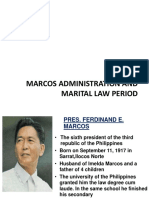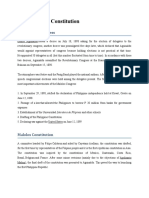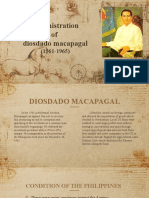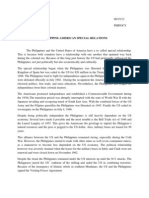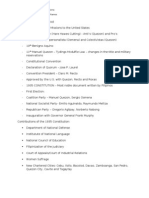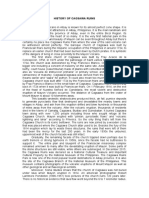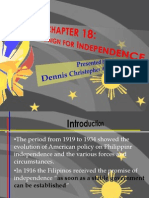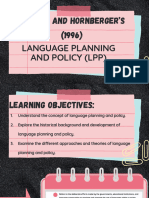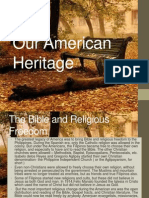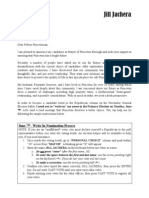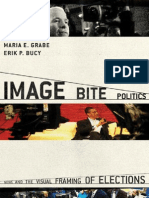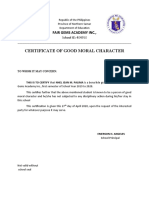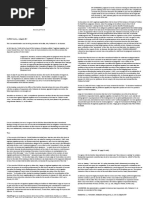50%(2)50% found this document useful (2 votes)
464 viewsGarcia'S Administration: Prepared By: Marc Rainier Briones
Garcia'S Administration: Prepared By: Marc Rainier Briones
Uploaded by
Briones Marc RainierCarlos P. Garcia was the 8th President of the Philippines. He implemented an austerity program to curb corruption and promoted a "Filipino First" policy to support domestic businesses. Some of the key issues during his administration included economic problems inherited from the previous government and reducing the long-term US military base agreement via the Bohlen-Serrano Agreement. Garcia emphasized reviving Filipino culture and established the Republic Cultural Award before retiring from politics.
Copyright:
© All Rights Reserved
Available Formats
Download as PPTX, PDF, TXT or read online from Scribd
Garcia'S Administration: Prepared By: Marc Rainier Briones
Garcia'S Administration: Prepared By: Marc Rainier Briones
Uploaded by
Briones Marc Rainier50%(2)50% found this document useful (2 votes)
464 views11 pagesCarlos P. Garcia was the 8th President of the Philippines. He implemented an austerity program to curb corruption and promoted a "Filipino First" policy to support domestic businesses. Some of the key issues during his administration included economic problems inherited from the previous government and reducing the long-term US military base agreement via the Bohlen-Serrano Agreement. Garcia emphasized reviving Filipino culture and established the Republic Cultural Award before retiring from politics.
Original Description:
Garcia administration ppt presentation
Original Title
GARCIA'S ADMINISTRATION
Copyright
© © All Rights Reserved
Available Formats
PPTX, PDF, TXT or read online from Scribd
Share this document
Did you find this document useful?
Is this content inappropriate?
Carlos P. Garcia was the 8th President of the Philippines. He implemented an austerity program to curb corruption and promoted a "Filipino First" policy to support domestic businesses. Some of the key issues during his administration included economic problems inherited from the previous government and reducing the long-term US military base agreement via the Bohlen-Serrano Agreement. Garcia emphasized reviving Filipino culture and established the Republic Cultural Award before retiring from politics.
Copyright:
© All Rights Reserved
Available Formats
Download as PPTX, PDF, TXT or read online from Scribd
Download as pptx, pdf, or txt
50%(2)50% found this document useful (2 votes)
464 views11 pagesGarcia'S Administration: Prepared By: Marc Rainier Briones
Garcia'S Administration: Prepared By: Marc Rainier Briones
Uploaded by
Briones Marc RainierCarlos P. Garcia was the 8th President of the Philippines. He implemented an austerity program to curb corruption and promoted a "Filipino First" policy to support domestic businesses. Some of the key issues during his administration included economic problems inherited from the previous government and reducing the long-term US military base agreement via the Bohlen-Serrano Agreement. Garcia emphasized reviving Filipino culture and established the Republic Cultural Award before retiring from politics.
Copyright:
© All Rights Reserved
Available Formats
Download as PPTX, PDF, TXT or read online from Scribd
Download as pptx, pdf, or txt
You are on page 1of 11
GARCIA’S ADMINISTRATION
PREPARED BY: MARC RAINIER BRIONES
CARLOS P. GARCIA
• Name: Carlos Polestico Garcia
• Birthday: NOVEMBER 4, 1896
• Birthplace: Talibon, Bohol
Philippines
• Parents: Policronio Garcia and
Ambrosia Polistico
• Education: Philippine Law School.
• Rather than practice law right away, he
worked as a teacher for two years at Bohol
Provincial High School. He became famous
for his poetry in Bohol, where he earned the
nickname "Prince of Visayan Poets" and the
"Bard from Bohol."
PRIMARY PROBLEMS
• The main problem that was facing the Garcia
administration was the current economic situation
during that time.
• Corruption was also prevalent in the country since he
had just iherited the magsaysay administration.
• The imports that were coming in the
country greatly outnumbered the exports
that we were shipping out of the country,.
AUSTERITY PROGRAM
• Austerity Program was
implemented by Garcia in
order to curt the rampant
graft and corruption within
the country. The program
centered on wise spending,
industry, thrift,
trustworthiness, integrity and
honesty.
FILIPINO FIRST POLICY
• It is a policy where Filipinos
should be first before anyone
else.
• Beneficiaries of the Filipino
First Policy The people that
benefited from this policy are
the businessmen of the
Philippines
REPUBLIC CULTURAL AWARD
•Garcia administration
also put emphasis on
reviving the Filipino
culture. In doing so, the
Republic Cultural Award
was created
BOHLEN–SERRANO AGREEMENT
• Bohlen-Serrano Agreement
was the law that shortened
the original 99 year lease of
US bases here in the
Philippines to 25 years, the
agreement was renewable
for periods only up to 5
years
• After his failed re-election bid, Garcia retired
to Tagbilaran to resume life as a private
citizen.
• On June 1, 1971, Garcia was elected delegate
of the 1971 Constitutional Convention,
where delegates elected him as President of
the convention.
• On June 14, 1971, Garcia died from a heart
attack on 5:57 p.m. at his Manila residence along
Bohol Avenue, Quezon City.
• Garcia was the first layman to lie in state in
Manila Cathedral—a privilege once reserved for
the Archbishops of Manila—and the first
President to be buried at the Libingan ng mga
Bayani
REFERENCES
•https://biography.yourdictionary.com/carlos-p-
garcia
•https://www.britannica.com/biography/Carlos-
P-Garcia
•https://www.slideshare.net/DexterJohnDacaya
nan/carlos-garcia
You might also like
- Ho'oponopono - Morrnah Simeona WayDocument6 pagesHo'oponopono - Morrnah Simeona Wayflicts9993% (27)
- MARCOSDocument21 pagesMARCOSNemie Tautho-Macaranas100% (1)
- PHILIPPINEHISTORY Pre Colonial PeriodDocument99 pagesPHILIPPINEHISTORY Pre Colonial PeriodDan Mark Piang100% (3)
- Panch Kalyanak Mahotsav - A Brief Introduction: Five Auspicious Events Are: Day One: Garbha-Klyanak-Inception CeremonyDocument2 pagesPanch Kalyanak Mahotsav - A Brief Introduction: Five Auspicious Events Are: Day One: Garbha-Klyanak-Inception CeremonyPamNo ratings yet
- Chapter 12 The Philippines Under The American RuleDocument33 pagesChapter 12 The Philippines Under The American RuleApril CaringalNo ratings yet
- The Philippines Under American TutelageDocument11 pagesThe Philippines Under American TutelagePaul Daniel GalangNo ratings yet
- How Is The State Affected by GlobalizationDocument3 pagesHow Is The State Affected by GlobalizationJan ChengayNo ratings yet
- 1899: Malolos ConstitutionDocument4 pages1899: Malolos ConstitutionNeil Patrick OrdoñezNo ratings yet
- Cultural Changes and IdentityDocument12 pagesCultural Changes and IdentityLawrence Bucayu0% (1)
- Basic Interview Skills PDFDocument2 pagesBasic Interview Skills PDFRaguNo ratings yet
- Macapagal MarcosDocument31 pagesMacapagal MarcosTRISHA MAE TABONESNo ratings yet
- The Declaration of Martial Law: Proclamation No. 1081Document17 pagesThe Declaration of Martial Law: Proclamation No. 1081Cherry Mae Morales BandijaNo ratings yet
- Lesson 7: Don Honorio Ventura StateuniversityDocument3 pagesLesson 7: Don Honorio Ventura StateuniversityGian TolentinoNo ratings yet
- The American Era, 1900-41" by Alfred MccoyDocument9 pagesThe American Era, 1900-41" by Alfred MccoyKian karl YumulNo ratings yet
- Pres. Carlos P. GarciaDocument20 pagesPres. Carlos P. GarciaClaire Esic Pontanar100% (1)
- Elpidio Quirino BiographyDocument4 pagesElpidio Quirino BiographyEarl John Fajarito Rafael50% (2)
- Developing On - Grade and Culturally Relevant Instructional MaterialsDocument16 pagesDeveloping On - Grade and Culturally Relevant Instructional MaterialsAilyn RamirezNo ratings yet
- Integration Into The Spanish EmpireDocument12 pagesIntegration Into The Spanish EmpireStar KingNo ratings yet
- Cuban Constitution: The Pact of Biak-na-BatoDocument3 pagesCuban Constitution: The Pact of Biak-na-BatoJorenal BenzonNo ratings yet
- Lesson 3 - The Dawn of Filipino NationalismDocument2 pagesLesson 3 - The Dawn of Filipino Nationalismkei_kawaii08100% (3)
- Philippine - American Special RelationsDocument2 pagesPhilippine - American Special RelationsPatNo ratings yet
- The 1935 ConstitutionDocument1 pageThe 1935 ConstitutionLuna Capit100% (1)
- History Through Paintings and Films SummaryDocument7 pagesHistory Through Paintings and Films Summarygiomascardo53100% (1)
- The Battle Agaisnt The Oppressors - 073412Document27 pagesThe Battle Agaisnt The Oppressors - 073412Jiemalyn Asis Gregorio100% (1)
- Propaganda MovementDocument36 pagesPropaganda Movementmaang alleijaNo ratings yet
- Gloria Macapagal Arroyo AdministrationDocument10 pagesGloria Macapagal Arroyo AdministrationArben John Gayramara50% (4)
- The Commonwealth PeriodDocument2 pagesThe Commonwealth Periodnikko norman100% (2)
- The Story of The Rizal LawDocument6 pagesThe Story of The Rizal Law셸라No ratings yet
- Ge2 PPT Malolos ConDocument11 pagesGe2 PPT Malolos ConAngelo SalazarNo ratings yet
- 1973 Constitutional AuthoritismDocument16 pages1973 Constitutional AuthoritismErica HerreraNo ratings yet
- #BracketAKaNa Documented EssayDocument3 pages#BracketAKaNa Documented EssayAliezah Mae Flores100% (4)
- The Constitution of The Philippine CommonwealthDocument11 pagesThe Constitution of The Philippine CommonwealthBJ AmbatNo ratings yet
- Rizal Sa DapitanDocument13 pagesRizal Sa DapitanAugusta Altobar100% (1)
- Rise of NationalismDocument29 pagesRise of NationalismmaricrisandemNo ratings yet
- A Brief Summary of The First Voyage Around The World by MagellanDocument9 pagesA Brief Summary of The First Voyage Around The World by MagellanChristine Niña AgdeppaNo ratings yet
- Agrarian Reform During The Administration of Macapagal, Marcos, and Corazon AquinoDocument19 pagesAgrarian Reform During The Administration of Macapagal, Marcos, and Corazon AquinoMatrix100% (1)
- History of Cagsawa RuinsDocument4 pagesHistory of Cagsawa RuinsSharivie LlandelarNo ratings yet
- Higaonon: The Last Tribe of MindanaoDocument26 pagesHigaonon: The Last Tribe of MindanaoDianne Joy FernandezNo ratings yet
- The Birth of Filipino NationalismDocument38 pagesThe Birth of Filipino NationalismMa Rita Alindada RearioNo ratings yet
- Spanish Colonization - FINALDocument85 pagesSpanish Colonization - FINALfayliza100% (3)
- Chapter 8 Controversies and Conflicting Issues in Philippine HistoryDocument15 pagesChapter 8 Controversies and Conflicting Issues in Philippine HistoryAce AbiogNo ratings yet
- The Circulo Hispano-FilipinoDocument5 pagesThe Circulo Hispano-FilipinoAlexander Vonn100% (1)
- My Written Report: Alberto H. Negre JRDocument4 pagesMy Written Report: Alberto H. Negre JRChris AlfonseNo ratings yet
- 1897 Constitution of Biak-na-BatoDocument8 pages1897 Constitution of Biak-na-BatoCara Delatuh50% (2)
- Guiding Principles in Teaching Araling PanlipunanDocument21 pagesGuiding Principles in Teaching Araling PanlipunanBalubal JericoNo ratings yet
- 1935 CONSTITUTION - Dacumos and ValdezDocument20 pages1935 CONSTITUTION - Dacumos and ValdezBJ AmbatNo ratings yet
- Jose Rizal PaintingsDocument10 pagesJose Rizal PaintingsCarlo DimarananNo ratings yet
- The Malolos Constitution PreambleDocument3 pagesThe Malolos Constitution PreambleTori Peige100% (1)
- I. ACTIVITY 1: Making Graphic Organizer Concept MapDocument2 pagesI. ACTIVITY 1: Making Graphic Organizer Concept MapRitz BarritaNo ratings yet
- The Malolos ConstitutionDocument3 pagesThe Malolos ConstitutionDIANE EDRANo ratings yet
- The Filipinos During The Pre-Spanish PeriodDocument86 pagesThe Filipinos During The Pre-Spanish PeriodAgnes94% (17)
- Philippine CartoonsDocument17 pagesPhilippine CartoonsMichelle Joy Vinluan EstradaNo ratings yet
- Campaign For IndependenceDocument55 pagesCampaign For IndependenceDennis Christopher Alfred Sajo100% (6)
- Rizal and Josephine BrackenDocument13 pagesRizal and Josephine BrackenEzekiel D. Rodriguez100% (2)
- Ricento and Hornberger (1996) LPP - 054131Document43 pagesRicento and Hornberger (1996) LPP - 054131canjakristelann0% (1)
- Biography of Apolinario MabiniDocument5 pagesBiography of Apolinario MabiniMalou Mico Castillo100% (1)
- Basco's Economic PlanDocument2 pagesBasco's Economic Planangel100% (1)
- Birth of NationalismDocument4 pagesBirth of NationalismArjix HandyManNo ratings yet
- Activity 2 Understanding The SelfDocument1 pageActivity 2 Understanding The SelfSedsed QuematonNo ratings yet
- Our American HeritageDocument18 pagesOur American HeritageJeremiah Nayosan0% (1)
- #7 Pres - Carlos P. GarciaDocument4 pages#7 Pres - Carlos P. GarciaChristopher BalagotNo ratings yet
- CarlosGarcia - PPT FORMAT HISTORICAL FIGURE RESEARCHDocument12 pagesCarlosGarcia - PPT FORMAT HISTORICAL FIGURE RESEARCHalexapodadera4No ratings yet
- Group 8 AP PresentationDocument36 pagesGroup 8 AP PresentationVerniel Jason JimenezNo ratings yet
- WEEK2 DLL ENGLISHDocument7 pagesWEEK2 DLL ENGLISHBriones Marc Rainier100% (1)
- EGAYDocument3 pagesEGAYBriones Marc RainierNo ratings yet
- RRLDocument3 pagesRRLBriones Marc RainierNo ratings yet
- Sample QuestionDocument45 pagesSample QuestionBriones Marc RainierNo ratings yet
- Part 1 Professional EducationDocument14 pagesPart 1 Professional EducationBriones Marc RainierNo ratings yet
- Ideal Site For Poultry and Livestock RaisingDocument4 pagesIdeal Site For Poultry and Livestock RaisingBriones Marc RainierNo ratings yet
- MultigradeDocument1 pageMultigradeBriones Marc RainierNo ratings yet
- Poultry ProductionDocument12 pagesPoultry ProductionBriones Marc RainierNo ratings yet
- The Importance and Prospect of Raising Farm AnimalsDocument18 pagesThe Importance and Prospect of Raising Farm AnimalsBriones Marc RainierNo ratings yet
- Teacher: Briones, Marc Rainier R Science Teaching Dates/Time: QuarterDocument4 pagesTeacher: Briones, Marc Rainier R Science Teaching Dates/Time: QuarterBriones Marc RainierNo ratings yet
- Activity 21: Drill and Review: Presenting The New Lesson Giving of Classroom RulesDocument3 pagesActivity 21: Drill and Review: Presenting The New Lesson Giving of Classroom RulesBriones Marc RainierNo ratings yet
- Lesson Plan EspDocument8 pagesLesson Plan EspBriones Marc RainierNo ratings yet
- Activity 20: Drill and Review: Presenting The New Lesson Giving of Classroom RulesDocument3 pagesActivity 20: Drill and Review: Presenting The New Lesson Giving of Classroom RulesBriones Marc RainierNo ratings yet
- Au Ah LapDocument11 pagesAu Ah LappaulmartogiNo ratings yet
- Chapter 3 Lesson 2 - Group 9Document23 pagesChapter 3 Lesson 2 - Group 9LalicanTeresa 1BTLEDANo ratings yet
- Organic Technical Committee of Balanga CityDocument6 pagesOrganic Technical Committee of Balanga CityALLAN PAUL V. TORRESNo ratings yet
- The Dispossessed. CH 8-10 Reading ResponseDocument2 pagesThe Dispossessed. CH 8-10 Reading ResponseMatt HermanNo ratings yet
- How To Read Your Bible PDFDocument68 pagesHow To Read Your Bible PDFNirma SuperNo ratings yet
- Creative Writing Hand OutsDocument6 pagesCreative Writing Hand OutsavynsierraNo ratings yet
- Ineke Elfira Juniar - Tugas BHS Inggris Lanjut - Meeting 1Document4 pagesIneke Elfira Juniar - Tugas BHS Inggris Lanjut - Meeting 1Ineke ElfiraNo ratings yet
- Jachera Letter Anouncing Mayoral CandidacyDocument2 pagesJachera Letter Anouncing Mayoral CandidacyPlanet PrincetonNo ratings yet
- O Level Sociology) (2251) : Unit 6: EducationDocument3 pagesO Level Sociology) (2251) : Unit 6: Educationmstudy123456No ratings yet
- Ajisafe Damilola Ifeoluwa - Digital Mental Health Tools For StudentsDocument3 pagesAjisafe Damilola Ifeoluwa - Digital Mental Health Tools For Studentsdajisafe829No ratings yet
- Executive Order No. 22, s.2024 (BHERTs)Document3 pagesExecutive Order No. 22, s.2024 (BHERTs)barangayiscaNo ratings yet
- Faulkner, William - New Orleans Sketches (Mississippi, 2002)Document175 pagesFaulkner, William - New Orleans Sketches (Mississippi, 2002)Florin Toader100% (1)
- Image Bite PoliticsDocument333 pagesImage Bite PoliticsAdina PopaNo ratings yet
- Overview of Regulations - Basic Operator Training Class 12-10-09Document31 pagesOverview of Regulations - Basic Operator Training Class 12-10-09Fetsum LakewNo ratings yet
- CS Form 100 - Revised September 2016Document3 pagesCS Form 100 - Revised September 2016John Lester M. Dela CruzNo ratings yet
- Internship ReportDocument36 pagesInternship ReportHaleema FarooqNo ratings yet
- Comprehensive Guide To VPNsDocument686 pagesComprehensive Guide To VPNsdennisborcherNo ratings yet
- Qttion SK Kelawit (LED SIGNBOARD)Document2 pagesQttion SK Kelawit (LED SIGNBOARD)Thompson Juna IINo ratings yet
- Literature Review On Crime and ViolenceDocument8 pagesLiterature Review On Crime and Violenceea6mkqw2100% (1)
- EU Blockchain Ecosystem Report - Final - 0Document200 pagesEU Blockchain Ecosystem Report - Final - 0Vitaliy Che KogoNo ratings yet
- Certificate of Good MoralDocument3 pagesCertificate of Good MoralJoanne Pauline Tenedero - RuelaNo ratings yet
- In Re. de GuzmanDocument2 pagesIn Re. de GuzmanchristimyvNo ratings yet
- How-Trade-Analyze Synthetic Indexes On Deriv PlatformDocument53 pagesHow-Trade-Analyze Synthetic Indexes On Deriv PlatformAhamed MohamedNo ratings yet
- Sir Syed Ahmed KhanDocument3 pagesSir Syed Ahmed KhanMaryam KhanNo ratings yet
- Catherine Crowe - Light and Darkness Or, Mysteries of Life I PDFDocument334 pagesCatherine Crowe - Light and Darkness Or, Mysteries of Life I PDFOCorpoNegroNo ratings yet
- Close IMC 9e Ch08 Ejm2Document13 pagesClose IMC 9e Ch08 Ejm2Surbhi SharmaNo ratings yet

